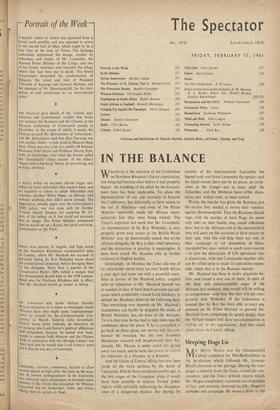IN THE BALANCE
WHATEVER is the outcome of the Conference on Northern Rhodesia's future constitution, one thing had become clear before it had properly begun : the handling of the affair by the Govern- ment here has been deplorable. To allow the representatives of one side formally to boycott the Conference, but informally to have access to the ear of Ministers—and even of the Prime Minister—inevitably made the African repre- sentatives feel they were being tricked. The Times's argument last week that Mr. Greenfield, 'as representative of Sir Roy Welensky, is very properly given easy access to the British Prime Minister' may be theoretically sound; but to the African delegates, Sir Roy is their chief adversary and the distinction in practice is meaningless. It must have struck Mr. Kaunda only as further evidence of English perfidy.
Surprisingly, on Monday the Times did one of its remarkable about-turns (as over South Africa a year ago) and came out with a powerful mani- festo in favour of the Macleod policy, coupled with an injunction to Mr. Macleod himself not to weaken in face of back-bench pressure (an edi- torial which predictably roused Lord Salisbury to defend the Rhodesia diehards the following day). That everything now depends on Mr. Macleod's staunchness can hardly be disputed. He alone, of British Ministers, has the trust of the Africans. To win that trust he has had to take them into his confidence about his plans. If he is compelled to go back on those plans, not merely will this con- ference be wrecked, but the new Southern Rhodesian concord will be chattered also; for, already, Mr. Nkome is under attack for giving away too much, and he lacks the power to control his followers of a Nyerere or a Kaunda.
And the future of Central Africa has now been made all the more perilous by the death of Lumumba. Had he been murdered months ago, in the first stages of the Congolese crisis, it would have been possible to express formal public regrets while privately welcoming the disappear- ance of a dangerous maniac. But .during the months of his imprisonment Lumumba the legend took over from Lumumba the upstart; and his death means there can be no peace, no settle- ment in the Congo—not at least, until the Tshombes and the Mobutus have either them- selves met violent ends, or been ousted.
Worse, the murder has given the Russians just the excuse they needed to revive their vendetta against Hammarskjold. That the Russians should rage, with the murder of Imre Nagy (to name only one) on their hands, may sound ridiculous here; but to the Africans and to the uncommitted they will seem on this occasion to have reason on their side. And this will help them not only in their campaign to rid themselves 'of Ham- marskjtild but also—which is much more sinister —to turn the directorate of UN operations into a triumvirate, with one Communist member who can be relied upon to make its operations impos- sible, when that is in the Russian interest.
Mr. Macleod has been in tricky situations be- fore, and found a way out of them; in spite of the deep and understandable anger of the Africans last weekend, they would still be willing to compromise--with him. But they will not com- promise with Welensky. If the impression is created that Sir Roy has been able to exert any pressure on the Prime Minister to prevent Mr. Macleod from completing his grand design, then the African leaders will have no compunction in pulling out of the negotiations. And that could wean chaos in Central Africa.


































 Previous page
Previous page